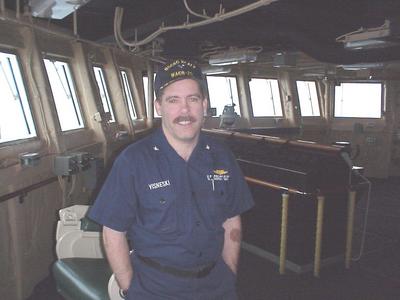
|
|
16 August, 2002
Captain David Visneski has served many roles (i.e. Executive Officer on the
Polar Sea, Chief Engineer on the Polar Star, Assistant Engineer on the Polar
Sea, and Assistant Engineer on the Westwind) in his more than 26 years in
the Coast Guard, and he currently serves as the Captain of the United States
Coast Guard Cutter (USCGC) Healy. He has always worked in the Polar
Regions, and has been on fourteen Arctic missions and four missions to
Antarctica. Although most Coast Guard officers are capable of any mission,
most also have a specialty, and Captain Visneski is a licensed engineer.
His other specialty is ship operations which means anything to do with
running the ship. Although most people assume that the Coast Guard stays
close to home and the United States, Captain Visneski joined not only
because he wanted to be in the Coast Guard but because he was interested in
seeing other parts of the world. He has certainly done that as he has
traveled to all parts of the world except the Middle East. He has also had
the unique opportunity to travel to both poles, something few people have
done. As a matter of fact, in 2001, the Healy was the second United States
ship to make it to the North Pole and the first ship U.S. ship to get there
unassisted. On that trip, the captain traveled around the world (the North
Pole) in half an hour!
What is a typical day like for the captain of a Coast Guard ice breaker?
When I asked that question, Capt. Visneski told me there is no such thing as
a typical day, parcticularly when the ship is in ice. Much of what he does
depends on ice conditions and what science is going on that day (or night).
I found it interesting that he must be notified for any operations. That
includes things such as personnel issues, weather changes, any equipment
that is not working properly, and other ships in the area. The phone in his
quarters rings on a regular basis! I found out that, when science is going
on, even the Captain likes the "pump boys!" (Remember that their work
involves four straight hours of pumping water and nothing else can happen
during that time. (See the journal for July 23.) He told me that he has
learned to sleep in 2-3 hour blocks of time, and he looks forward to open
ocean transits when he can sleep a bit longer without being woken up. Even
when the ship is in its home port of Seattle, the Captain is on board doing
all that is necessary to plan for the next mission.
When I asked the Captain how the Healy compares to other ships he has been
on, he said the biggest difference is that it is brand new and "it still has
that new car smell!" All the equipment is state of the art and highly
technical. Due to automation and computerization, the ship can run with
45-50% less crewmembers than other icebreakers. The bridge navigation
systems are fully integrated. As a result, the Healy is certified to have
only one person on the bridge at a time. The Healy always has two people on
the bridge, but some ships require as many as six at a time. The engine
room and all machinery spaces are unmanned. That watch is also designed for
one person, but the Healy always has two in the Engineering Control Center.
(See my journal for August 4.)
Alexander Hamilton started the United States Coast Guard in 1790 when the
Coast Guard consisted of sailing ships and was named the Revenue Cutter
Service. In the Coast Guard today, any vessel more than 65 feet long is
called a "cutter." Captain Visneski also gave me some interesting facts
about the Healy. The Healy can sustain a crew on board for up to eight
months, and it has enough fuel on board to go around the world once at the
equator. While many ships carry a single helicopter, the Healy carries two.
The ship essentially serves as an airport, a fire department, a hospital, a
restaurant and a floating science research laboratory! You can learn more
about the USCGC Healy at their website at www.uscg.mil/pacarea/healy.

<> Captain David Visnesky is the Captain of the United States Coast Guard Cutter (USCGC) Healy.
Contact the TEA in the field at
.
If you cannot connect through your browser, copy the
TEA's e-mail address in the "To:" line of
your favorite e-mail package.
|
